11 Movies That are Well Worth the Added Effort of Reading Subtitles
I’ve been writing here and there on this post for a while now, and I figured since LJ access is so spotty lately, I’d better finish up and post before there’s another long outage.
This post was inspired by a movie I watched and reviewed recently, The Bubble. The movie is in Hebrew and Arabic, with a little English thrown in. I really enjoyed it, and it got me going on a bit of a foreign film kick, as well as thinking about foreign films I’ve seen in the past and liked a lot.
I also know that some people aren’t big fans of subtitled films. I understand that sometimes it can be difficult to read a translation and watch what’s happening onscreen, but I wanted to put together a list of cool movies that I think are well worth the extra effort of reading subtitles-plus a few where subtitles actually affect and enhance the movie itself.
This isn’t a “top ten best” list, just a list of movies I’ve liked. I feel bad that my list is not at all geographically dispersed. It’s very heavy on Asian films, which reflects my tendencies to some extent, but I easily could have put Amelie, Il Postino, Pan’s Labyrinth, and The Science of Sleep and many others on this list, too; I just went with films I immediately knew I had something to say about. Some of them are not foreign films, but all involve subtitles.
1. Everything is Illuminated (U.S., set in Ukraine)
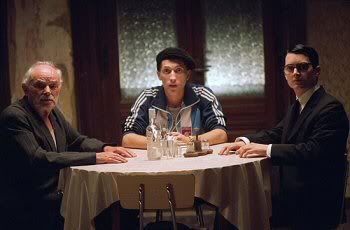
I know it’s blasphemy, but I actually like the movie far more than the book. Jewish-American Jonathan travels to Ukraine to learn more about the home village of his grandfather, particularly the woman who helped him escape just before the Germans invaded in World War II. He’s a little shocked that his guided tour consists of translator Alex, a young man from Odessa who acts like he’s from Harlem and who sounds like he learned English from a thesaurus that was off by one entry; Alex’s crotchety grandfather, their driver; and Sammy Davis Junior-Junior, Grandfather’s temperamental, beloved dog. Their trip through the Ukrainian countryside provides some delightful moments of culture shock, but Jonathan isn’t the only one who makes some stunning discoveries in their quest to find a village that might not even exist anymore.
So much of this movie’s humor-and even much of its drama-is driven by what’s lost in translation. Subtitles are the key to this formula, letting the audience in on information all the characters hear but only some of them understand. I think that translation humor is inherently funnier on film than it is in a book, which is a big part of why I prefer the film. The film isn’t nearly as dark as the book, either, and I like how Grandfather’s part in the story plays out in the movie-it’s less predictable than the book. Also, I feel like Jonathan is much more of a character in the film, and I love how his habit (hobby? obsession?) ties in at the end.
2. The King and the Clown (Korea)
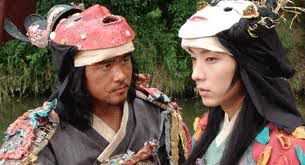
The two main characters in this film are definitely going on my list of favorite friendship OTPs. Jang-Seng and Gol-Gil are very talented traveling minstrels in 15th Century Korea. Jang-seng is clever and outspoken, and Gol-Gil is very, very pretty. Both of these traits get the men into a lot of trouble. A performance for the King gets the minstrel troupe trapped in a deadly web of political intrigue and insanity.
Though there are some (what I think are intentional) references to King Lear, this is a very unique movie. The stunts and clown routines are fun to watch on their own, and I think the filmmakers knew exactly what they were doing when they decided to have so much of the film take place on a tightrope. But the very best part is the relationship between Jan-Seng and Gol-Gil. To me, it reads platonic, but whether it’s sexual or not really doesn’t matter-it’s the depth of feelings that is so compelling.
3. Yossi & Jagger (Israel)
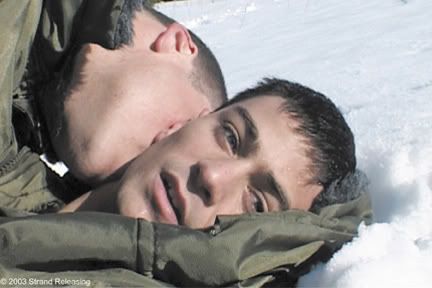
The film more than makes up for the simplicity of the story with an overabundance of heart. Yossi is the commanding officer of a company of Israeli soldiers in the snowy mountains on the border of Lebanon. Lior, nicknamed “Jagger” because of his rock-star good looks and popularity, is Yossi’s second-in-command, and also his lover. Yossi is so far in the closet, he gets nervous about the wildlife watching him have sex with Lior. Lior longs for a more open relationship and demands that once they’re out of the army, they’re going to go on vacation together and get a room with one bed. When Yossi’s superior officer comes to the camp to order the men on an ambush, you know what’s going to happen, but you care so much about the characters that it still hurts to watch.
The film is very smartly written and has a lot of the playfulness, attention to supporting characters, and foreshadowing that I loved in director Eytan Fox’s other film on this list, The Bubble. The film’s greatest strength, though, is its leads: Ohad Knoller, who plays a very different gay man here than he does in The Bubble, and Yehuda Levi, who apparently is a popular Israeli soap opera star. Unlike The Bubble, the very last scene is absolutely perfect. I saw the general contours of that scene coming miles away, but the actual conversation surprised me. And yet, now that I’ve seen it, it couldn’t have gone any other way.
The film’s only real shortcoming is a rare one: it could have been a lot longer. It’s only about 70 minutes; I believe it was originally made for Israeli television. I would have loved to see more of Yossi and Lior’s relationship, even though I saw enough of it to flesh out the rest in my mind. I think a longer film could have hidden the inevitable part of the ending a little bit better, though. Still, a great little movie, and I see why it became a surprise hit in Israel.
4. Lust, Caution (China)
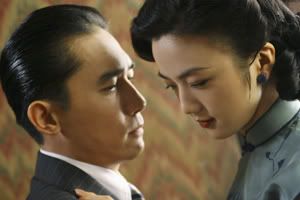
Brutal. Wang, a student with a talent for acting, joins a group of friends in a naïve plan to assassinate Mr. Yee, a powerful and dangerous figure within the Japanese puppet government ruling China. Their plan fails spectacularly, but a few years later, Wang is approached by Chinese rebels to help with an assassination attempt once again. Wang uses her old fictitious identity and her acting skills to get very, very close to Mr. Yee. Wang’s biggest problem is not maintaining her cover, but maintaining her sense of self as the role she plays threatens to overwhelm her.
This is a good film, but it’s hard to watch. Sex and violence overlap in (intentionally) disturbing ways, and both are shot very explicitly. Tony Leung does the impossible in playing Mr. Yee as a cold, vicious, awful person, and yet there are moments of…not sympathy, not even close, but at least humanity. Tang Wei’s Wang is very compelling as well. I love the scene where she explains to her handlers the reality of what they’ve asked her to do. Like The Bubble, one of the main characters makes a shocking decision near the end. My friend walked out of the movie baffled at how the character could have done that; I felt I got what the character was thinking. Whether you buy the ending or not, the movie will make you think.
5. Hero (China)
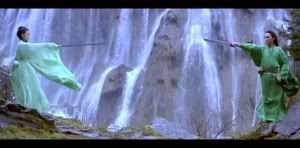
The plot is as twisty and bendy as the wire-fu, and I love it. A nameless prefect comes to the palace of the king of one of China’s warring nation-states to present him with three swords. These aren’t just any swords: they are the swords of three great warriors who tried to assassinate the king. Since their assassination attempt, the king hasn’t allowed anyone to come within 100 paces of him. Nameless recounts for the king the stories of how he defeated each assassin, and with each story, the king lets him come a little closer. But when Nameless’s stories are done, the king has his own tale to tell.
This is another great story about the power of storytelling, a popular theme with me. I wonder if they use different dialects in the film-obviously not something I’d catch with subtitles and no ear for the language, but it would be interesting. I love how director Zhang Yimou uses color schemes to separate each story. The plot is complex enough that those visual cues are absolutely vital to keep things straight. Plus, they’re gorgeous. I think the Red Sequence with the attack on the monastery is my favorite, though the White Sequence at the end is a close second.
I highly recommend reading Roger Ebert’s blog entries on this film and also on the Beijing 2008 Olympics Opening Ceremony, also directed by Zhang Yimou, along with watching the film. There’s a whole political dimension to Nameless and the king’s interactions that I didn’t catch but find fascinating. Don’t be put off by the fact that Jet Li is in it. It’s not a Jet Li movie, if you know what I mean.
6. Shall We Dance? (Japan)
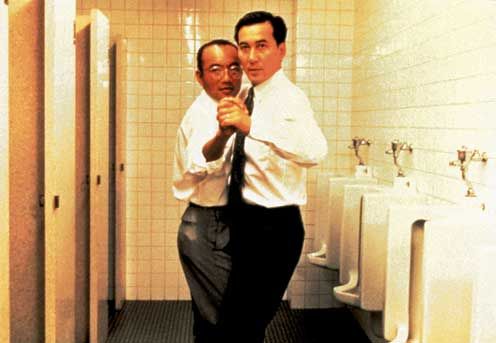
Despite the photo, this one actually isn’t a gay-themed film. ;) Shohei Sugiyama is a company man with a nice but unfulfilling life. One day on his train ride home, he spots a beautiful woman in a dance studio. He becomes infatuated with the woman and takes up ballroom dancing classes to get closer to her. As his lessons progress, he discovers that the dancing itself is giving him the passion in his life he longs for.
This is just a brilliant, silly, sad, and joyful movie about finding your passion. At times, I was a little uncomfortable with Shohei’s crush on Mai, since he’s married, but you’re meant to be uncomfortable with it, I think. It keeps him from being a perfect nice guy. The characters are very well-drawn, even Shohei’s more cartoonish co-worker who leads an even more dramatic dancing double-life than Shohei (complete with ridiculous wig).
7. Grave of the Fireflies (Japan)
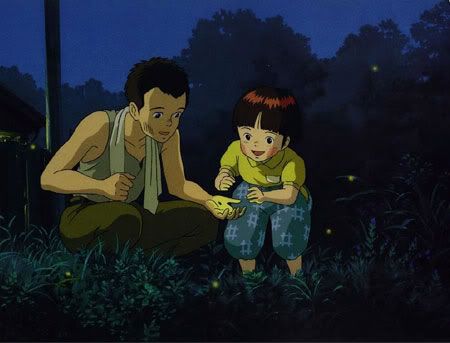
Bring a whole box of kleenex for this one, folks. This is a hard film to summarize, even though the plot is fairly simple. The problem is, you find out how the story ends in the first five minutes of the film, and even so, you find yourself hoping against hope that you’re wrong up to the end. The film follows two young siblings, Seita and Setsuko, during and after the firebombing of Tokyo. Seita has to make decisions that no child should have to make, which ultimately leads to tragedy.
Though I never watch live-action dubs, I usually watch dubbed animation. I figure, hey, they were dubbed in their original language, too, and at least with the little anime I’ve seen (mostly Hayao Miyazaki and Shinichiro Watanabe), the American dubs are quite good. I’m glad I broke with my usual practice for this one and watched with the original Japanese cast and subtitles, though. It’s an odd thing to say, but considering the character’s age, I don’t think a director could have gotten such a human, authentic portrayal of Setsuka from an actual child. I love the things that she catches on to and the things she doesn’t, how she can find joy in awful situations and fall apart even when things aren’t that bad, just like a real child would. The ending is utterly heartbreaking.
I think for Americans, the film reads as a condemnation of the bombing of civilian population centers in Japan during World War II. I found it interesting that the director said it was in part a critique of Japan’s decision-making at the time, too-that, like with Seita, pride got in the way of making decisions that were best for human welfare. Perhaps the saddest thing of all is that the story is semi-autobiographical.
8. Inglourious Basterds (U.S., set in German-occupied France)
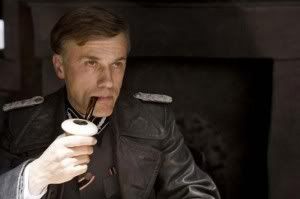
There’s gore aplenty, but the linguistic playfulness is what sets the film apart for me. The plot is crazy: an alternate-universe World War II in which special forces American Jews and a European Jewish woman hiding in plain sight by running a Parisian cinema separately plot to assassinate Hitler at a movie premiere in 1944. Then there’s Colonel Hans Landa, the Jew Hunter, who is…quite the individual.
Subtitles are necessary, as the film bounces from French to German to English to Italian, but like in Everything is Illuminated, they’re used for humorous and dramatic effect as well. Landa, brilliantly played by Christoph Waltz, creates most of these moments, since he is able to navigate all these languages with ease. The first scene is famously chilling for this reason, but there are several other moments of linguistic and cultural “passing” and failing to pass. Interestingly, it’s Landa’s inability to understand American culture that brings about his (relatively minor, but still) comeuppance in the end.
9. Old Boy (Korea)
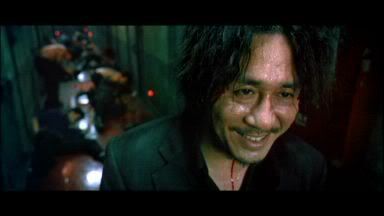
This is a really well-done movie, but the ending is just so…squicky (though also very clever) that I can’t watch it again. Oh Dae-su goes out for a night on the town, and in his drunken stupor is abducted and taken to a prison, of sorts: a hotel room decorated circa 1960 that he can’t get out of. He spends his time trying to kill himself, training himself in martial arts, and watching TV. Fifteen years later, he’s let out for no apparent reason and told he has a few days to figure out what he had done that had moved someone to take such drastic revenge on him. What Oh Dae-su doesn’t know is that the revenge has only just begun.
Despite the summary, this is actually a really funny movie, until the end. One of the reasons I had to include this movie is because it uses subtitles for humorous effect. (Let’s just say they found a way to make me laugh at dental torture. Yeah, I know.) Also, even though I don’t know Korean, Min-sik Choi’s delivery is so wonderfully deadpan, I can’t imagine this movie being dubbed, even though technically it wouldn’t be too hard because of the liberal use of voiceover. Heck, I’m still struggling with the idea of an American remake, though Spike Lee is probably a better fit for it than Steven Spielberg, who was attached to the project earlier. I still wonder if an American studio will have the guts to keep the original ending.
10. Rashomon (Japan)
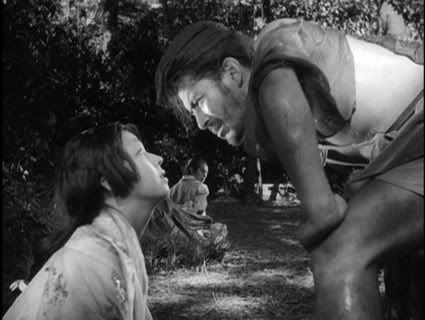
It pains me to say it, but this movie is probably a little better than the classic short story it’s based on. A woodcutter, a priest, and a carpenter sit under the Rashomon gate, waiting for the rain to stop. The woodcutter and priest were witnesses at a very unusual murder trial, and they recount the story for the commoner. A samurai was found dead in the woods. He and his wife were stopped by a robber. The three “witnesses” to the crime itself-the robber, the wife, and the samurai, speaking through a medium-don’t agree on anything else. Most curiously, each of them claims to have been the one who killed the samurai. The commoner realizes there’s one story left untold.
I believe this was one of the first films to use inconsistent flashbacks, and it does it very, very well. Again, it’s all about the power of perspective and storytelling, so it wins serious thematic points with me. The film takes place essentially in three settings: the gate, the trial, and the wooded glade where the samurai died, and yet it’s so intense and compelling. The original short story ends before the film does, and the first time I saw the film, I groaned when I realized it was adding to the story. The original short story was perfect! But it did, and it came up with a perfect ending.
11. The Bubble (Israel)
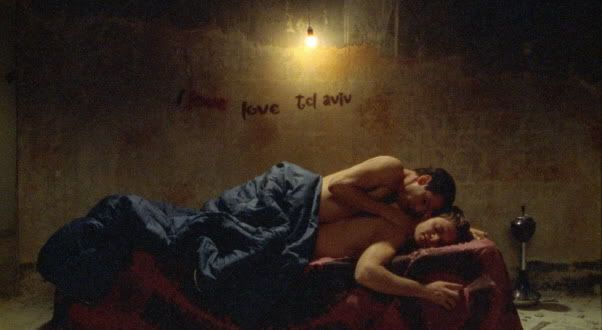
(This is a summary of my other review; for more details (don’t worry, the spoilery section is clearly marked as such), it’s over here.)
It’s Romeo and Juliet, only gay and Israeli, and Benvolio is an awesome woman. Three roommates live in Tel Aviv's version of Greenwich Village, and one of them becomes romantically entangled with a Palestinian. Noam and Ashraf fall in love and into each other’s lives quite quickly, and things get complicated very fast. The "bubble" of the title is the way locals describe how disconnected Tel Aviv and its inhabitants are from the tensions and violence that are a part of daily life in the rest of Israel and Palestine. Ashraf almost wonderingly enjoys at least parts of life inside this bubble, for a while-though in order to be openly gay, which he can't be at home, he must pretend to be Israeli, so he won't be sent back to Palestine. However, his very presence brings in part of that world outside the bubble.
I love it when writers and directors mix tones, and I think this movie does an excellent job of tapping into both humor and tragedy. The main cast is excellent. I really liked all four leads, but Ashraf and Lulu were especially great. Everyone had good chemistry and rapport, and I really believed they were all friends. The romance was excellent as well. The beginning was a bit abrupt for my tastes, but it deepened, and there were some lovely touches throughout the film, especially the eyebrow thing from the play-you’ll know exactly what I’m talking about when you see it. The sex scenes are also quite good-maybe not completely anatomically accurate (but then again, what do I know), but emotionally very, very good.
This post was inspired by a movie I watched and reviewed recently, The Bubble. The movie is in Hebrew and Arabic, with a little English thrown in. I really enjoyed it, and it got me going on a bit of a foreign film kick, as well as thinking about foreign films I’ve seen in the past and liked a lot.
I also know that some people aren’t big fans of subtitled films. I understand that sometimes it can be difficult to read a translation and watch what’s happening onscreen, but I wanted to put together a list of cool movies that I think are well worth the extra effort of reading subtitles-plus a few where subtitles actually affect and enhance the movie itself.
This isn’t a “top ten best” list, just a list of movies I’ve liked. I feel bad that my list is not at all geographically dispersed. It’s very heavy on Asian films, which reflects my tendencies to some extent, but I easily could have put Amelie, Il Postino, Pan’s Labyrinth, and The Science of Sleep and many others on this list, too; I just went with films I immediately knew I had something to say about. Some of them are not foreign films, but all involve subtitles.
1. Everything is Illuminated (U.S., set in Ukraine)

I know it’s blasphemy, but I actually like the movie far more than the book. Jewish-American Jonathan travels to Ukraine to learn more about the home village of his grandfather, particularly the woman who helped him escape just before the Germans invaded in World War II. He’s a little shocked that his guided tour consists of translator Alex, a young man from Odessa who acts like he’s from Harlem and who sounds like he learned English from a thesaurus that was off by one entry; Alex’s crotchety grandfather, their driver; and Sammy Davis Junior-Junior, Grandfather’s temperamental, beloved dog. Their trip through the Ukrainian countryside provides some delightful moments of culture shock, but Jonathan isn’t the only one who makes some stunning discoveries in their quest to find a village that might not even exist anymore.
So much of this movie’s humor-and even much of its drama-is driven by what’s lost in translation. Subtitles are the key to this formula, letting the audience in on information all the characters hear but only some of them understand. I think that translation humor is inherently funnier on film than it is in a book, which is a big part of why I prefer the film. The film isn’t nearly as dark as the book, either, and I like how Grandfather’s part in the story plays out in the movie-it’s less predictable than the book. Also, I feel like Jonathan is much more of a character in the film, and I love how his habit (hobby? obsession?) ties in at the end.
2. The King and the Clown (Korea)

The two main characters in this film are definitely going on my list of favorite friendship OTPs. Jang-Seng and Gol-Gil are very talented traveling minstrels in 15th Century Korea. Jang-seng is clever and outspoken, and Gol-Gil is very, very pretty. Both of these traits get the men into a lot of trouble. A performance for the King gets the minstrel troupe trapped in a deadly web of political intrigue and insanity.
Though there are some (what I think are intentional) references to King Lear, this is a very unique movie. The stunts and clown routines are fun to watch on their own, and I think the filmmakers knew exactly what they were doing when they decided to have so much of the film take place on a tightrope. But the very best part is the relationship between Jan-Seng and Gol-Gil. To me, it reads platonic, but whether it’s sexual or not really doesn’t matter-it’s the depth of feelings that is so compelling.
3. Yossi & Jagger (Israel)

The film more than makes up for the simplicity of the story with an overabundance of heart. Yossi is the commanding officer of a company of Israeli soldiers in the snowy mountains on the border of Lebanon. Lior, nicknamed “Jagger” because of his rock-star good looks and popularity, is Yossi’s second-in-command, and also his lover. Yossi is so far in the closet, he gets nervous about the wildlife watching him have sex with Lior. Lior longs for a more open relationship and demands that once they’re out of the army, they’re going to go on vacation together and get a room with one bed. When Yossi’s superior officer comes to the camp to order the men on an ambush, you know what’s going to happen, but you care so much about the characters that it still hurts to watch.
The film is very smartly written and has a lot of the playfulness, attention to supporting characters, and foreshadowing that I loved in director Eytan Fox’s other film on this list, The Bubble. The film’s greatest strength, though, is its leads: Ohad Knoller, who plays a very different gay man here than he does in The Bubble, and Yehuda Levi, who apparently is a popular Israeli soap opera star. Unlike The Bubble, the very last scene is absolutely perfect. I saw the general contours of that scene coming miles away, but the actual conversation surprised me. And yet, now that I’ve seen it, it couldn’t have gone any other way.
The film’s only real shortcoming is a rare one: it could have been a lot longer. It’s only about 70 minutes; I believe it was originally made for Israeli television. I would have loved to see more of Yossi and Lior’s relationship, even though I saw enough of it to flesh out the rest in my mind. I think a longer film could have hidden the inevitable part of the ending a little bit better, though. Still, a great little movie, and I see why it became a surprise hit in Israel.
4. Lust, Caution (China)

Brutal. Wang, a student with a talent for acting, joins a group of friends in a naïve plan to assassinate Mr. Yee, a powerful and dangerous figure within the Japanese puppet government ruling China. Their plan fails spectacularly, but a few years later, Wang is approached by Chinese rebels to help with an assassination attempt once again. Wang uses her old fictitious identity and her acting skills to get very, very close to Mr. Yee. Wang’s biggest problem is not maintaining her cover, but maintaining her sense of self as the role she plays threatens to overwhelm her.
This is a good film, but it’s hard to watch. Sex and violence overlap in (intentionally) disturbing ways, and both are shot very explicitly. Tony Leung does the impossible in playing Mr. Yee as a cold, vicious, awful person, and yet there are moments of…not sympathy, not even close, but at least humanity. Tang Wei’s Wang is very compelling as well. I love the scene where she explains to her handlers the reality of what they’ve asked her to do. Like The Bubble, one of the main characters makes a shocking decision near the end. My friend walked out of the movie baffled at how the character could have done that; I felt I got what the character was thinking. Whether you buy the ending or not, the movie will make you think.
5. Hero (China)

The plot is as twisty and bendy as the wire-fu, and I love it. A nameless prefect comes to the palace of the king of one of China’s warring nation-states to present him with three swords. These aren’t just any swords: they are the swords of three great warriors who tried to assassinate the king. Since their assassination attempt, the king hasn’t allowed anyone to come within 100 paces of him. Nameless recounts for the king the stories of how he defeated each assassin, and with each story, the king lets him come a little closer. But when Nameless’s stories are done, the king has his own tale to tell.
This is another great story about the power of storytelling, a popular theme with me. I wonder if they use different dialects in the film-obviously not something I’d catch with subtitles and no ear for the language, but it would be interesting. I love how director Zhang Yimou uses color schemes to separate each story. The plot is complex enough that those visual cues are absolutely vital to keep things straight. Plus, they’re gorgeous. I think the Red Sequence with the attack on the monastery is my favorite, though the White Sequence at the end is a close second.
I highly recommend reading Roger Ebert’s blog entries on this film and also on the Beijing 2008 Olympics Opening Ceremony, also directed by Zhang Yimou, along with watching the film. There’s a whole political dimension to Nameless and the king’s interactions that I didn’t catch but find fascinating. Don’t be put off by the fact that Jet Li is in it. It’s not a Jet Li movie, if you know what I mean.
6. Shall We Dance? (Japan)

Despite the photo, this one actually isn’t a gay-themed film. ;) Shohei Sugiyama is a company man with a nice but unfulfilling life. One day on his train ride home, he spots a beautiful woman in a dance studio. He becomes infatuated with the woman and takes up ballroom dancing classes to get closer to her. As his lessons progress, he discovers that the dancing itself is giving him the passion in his life he longs for.
This is just a brilliant, silly, sad, and joyful movie about finding your passion. At times, I was a little uncomfortable with Shohei’s crush on Mai, since he’s married, but you’re meant to be uncomfortable with it, I think. It keeps him from being a perfect nice guy. The characters are very well-drawn, even Shohei’s more cartoonish co-worker who leads an even more dramatic dancing double-life than Shohei (complete with ridiculous wig).
7. Grave of the Fireflies (Japan)

Bring a whole box of kleenex for this one, folks. This is a hard film to summarize, even though the plot is fairly simple. The problem is, you find out how the story ends in the first five minutes of the film, and even so, you find yourself hoping against hope that you’re wrong up to the end. The film follows two young siblings, Seita and Setsuko, during and after the firebombing of Tokyo. Seita has to make decisions that no child should have to make, which ultimately leads to tragedy.
Though I never watch live-action dubs, I usually watch dubbed animation. I figure, hey, they were dubbed in their original language, too, and at least with the little anime I’ve seen (mostly Hayao Miyazaki and Shinichiro Watanabe), the American dubs are quite good. I’m glad I broke with my usual practice for this one and watched with the original Japanese cast and subtitles, though. It’s an odd thing to say, but considering the character’s age, I don’t think a director could have gotten such a human, authentic portrayal of Setsuka from an actual child. I love the things that she catches on to and the things she doesn’t, how she can find joy in awful situations and fall apart even when things aren’t that bad, just like a real child would. The ending is utterly heartbreaking.
I think for Americans, the film reads as a condemnation of the bombing of civilian population centers in Japan during World War II. I found it interesting that the director said it was in part a critique of Japan’s decision-making at the time, too-that, like with Seita, pride got in the way of making decisions that were best for human welfare. Perhaps the saddest thing of all is that the story is semi-autobiographical.
8. Inglourious Basterds (U.S., set in German-occupied France)

There’s gore aplenty, but the linguistic playfulness is what sets the film apart for me. The plot is crazy: an alternate-universe World War II in which special forces American Jews and a European Jewish woman hiding in plain sight by running a Parisian cinema separately plot to assassinate Hitler at a movie premiere in 1944. Then there’s Colonel Hans Landa, the Jew Hunter, who is…quite the individual.
Subtitles are necessary, as the film bounces from French to German to English to Italian, but like in Everything is Illuminated, they’re used for humorous and dramatic effect as well. Landa, brilliantly played by Christoph Waltz, creates most of these moments, since he is able to navigate all these languages with ease. The first scene is famously chilling for this reason, but there are several other moments of linguistic and cultural “passing” and failing to pass. Interestingly, it’s Landa’s inability to understand American culture that brings about his (relatively minor, but still) comeuppance in the end.
9. Old Boy (Korea)

This is a really well-done movie, but the ending is just so…squicky (though also very clever) that I can’t watch it again. Oh Dae-su goes out for a night on the town, and in his drunken stupor is abducted and taken to a prison, of sorts: a hotel room decorated circa 1960 that he can’t get out of. He spends his time trying to kill himself, training himself in martial arts, and watching TV. Fifteen years later, he’s let out for no apparent reason and told he has a few days to figure out what he had done that had moved someone to take such drastic revenge on him. What Oh Dae-su doesn’t know is that the revenge has only just begun.
Despite the summary, this is actually a really funny movie, until the end. One of the reasons I had to include this movie is because it uses subtitles for humorous effect. (Let’s just say they found a way to make me laugh at dental torture. Yeah, I know.) Also, even though I don’t know Korean, Min-sik Choi’s delivery is so wonderfully deadpan, I can’t imagine this movie being dubbed, even though technically it wouldn’t be too hard because of the liberal use of voiceover. Heck, I’m still struggling with the idea of an American remake, though Spike Lee is probably a better fit for it than Steven Spielberg, who was attached to the project earlier. I still wonder if an American studio will have the guts to keep the original ending.
10. Rashomon (Japan)

It pains me to say it, but this movie is probably a little better than the classic short story it’s based on. A woodcutter, a priest, and a carpenter sit under the Rashomon gate, waiting for the rain to stop. The woodcutter and priest were witnesses at a very unusual murder trial, and they recount the story for the commoner. A samurai was found dead in the woods. He and his wife were stopped by a robber. The three “witnesses” to the crime itself-the robber, the wife, and the samurai, speaking through a medium-don’t agree on anything else. Most curiously, each of them claims to have been the one who killed the samurai. The commoner realizes there’s one story left untold.
I believe this was one of the first films to use inconsistent flashbacks, and it does it very, very well. Again, it’s all about the power of perspective and storytelling, so it wins serious thematic points with me. The film takes place essentially in three settings: the gate, the trial, and the wooded glade where the samurai died, and yet it’s so intense and compelling. The original short story ends before the film does, and the first time I saw the film, I groaned when I realized it was adding to the story. The original short story was perfect! But it did, and it came up with a perfect ending.
11. The Bubble (Israel)

(This is a summary of my other review; for more details (don’t worry, the spoilery section is clearly marked as such), it’s over here.)
It’s Romeo and Juliet, only gay and Israeli, and Benvolio is an awesome woman. Three roommates live in Tel Aviv's version of Greenwich Village, and one of them becomes romantically entangled with a Palestinian. Noam and Ashraf fall in love and into each other’s lives quite quickly, and things get complicated very fast. The "bubble" of the title is the way locals describe how disconnected Tel Aviv and its inhabitants are from the tensions and violence that are a part of daily life in the rest of Israel and Palestine. Ashraf almost wonderingly enjoys at least parts of life inside this bubble, for a while-though in order to be openly gay, which he can't be at home, he must pretend to be Israeli, so he won't be sent back to Palestine. However, his very presence brings in part of that world outside the bubble.
I love it when writers and directors mix tones, and I think this movie does an excellent job of tapping into both humor and tragedy. The main cast is excellent. I really liked all four leads, but Ashraf and Lulu were especially great. Everyone had good chemistry and rapport, and I really believed they were all friends. The romance was excellent as well. The beginning was a bit abrupt for my tastes, but it deepened, and there were some lovely touches throughout the film, especially the eyebrow thing from the play-you’ll know exactly what I’m talking about when you see it. The sex scenes are also quite good-maybe not completely anatomically accurate (but then again, what do I know), but emotionally very, very good.